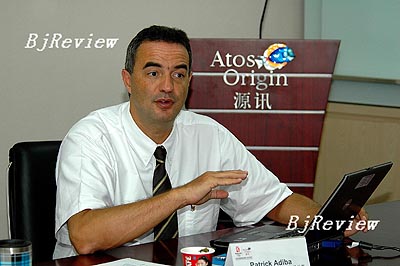
What will be the greatest IT challenges for the Beijing Olympics, and how will the organizers guarantee security during the Games? In a recent interview with Beijing Review, Patrick Adiba, Executive Vice President in charge of the Olympics and Major Events from IT company Atos Origin, talked about the latest developments in the Beijing Olympics IT project.
Beijing Review: What role will Atos Origin play in the Beijing Olympics IT project?
Patrick Adiba: We are the system integrator, and we do the entire project management for all the technology. Everything related to information technology in the Games is our responsibility.
Since the Olympic IT project is far from a normal IT project, the deadline is non-negotiable, and there are no second chances: everything must work, from the opening ceremony on August 8, 2008, right to the end.
What is the biggest challenge at the Beijing Olympics in terms of technology?
The Beijing Olympics will be the largest sports event ever in the world. It will be held in seven cities in more than 60 competition and non-competition venues. There will be 28 sports, 37 disciplines, and 302 events. More than 10,000 athletes, 15,550 media, and 70,000 volunteers will be involved in the games, which means that the accreditations issued will be over 200,000.
The main difference between the Beijing Olympics and the previous three Olympics (Salt Lake City, Athens and Torino) we worked on, is that the scope of the Beijing Olympics is wider-the most distant venue of the 2008 Olympics is Hong Kong, 3.5 hours away by air.
Which phase has Atos Origin currently reached in terms of preparation? Has there been any technology innovation and evolution in planning for the Beijing Olympics so far?
We are starting the testing phase after the planning, designing and building phases. We do many types of testing: system tests, integration tests, acceptance tests from the sport federations, for they come and tell us whether the tests correspond to the rule of the sport, and test events.
Of course, the IT security system has made a lot of innovations in terms of architecture and content, because we operate in Beijing, and as I said earlier, in a wider range of locations. The second part of innovation is all about the remote systems. There are a lot of systems we provide in a remote way, particularly for journalists and TV media.
In addition, there will be technical rehearsals (TR) at the end of the testing phase. Before the Games, we have two simulations of the Games, namely TR 1 (100 days prior) and TR 2 (50 days prior). We simulate real Olympics facilities; we have real people operating and some people observing and creating problems, such as a fire in the Technology Operation Center or a virus infection-everything that might go wrong-to see that everything is fully ready.
How do you see the relationship between Atos Origin and its Chinese IT partners progressing?
So far it has been excellent. We are extremely surprised by the quality of our Chinese partners-the technical level is very high, and our integration with them has been extremely good. So we are very satisfied not only with Lenovo, China Mobile and China Netcom, but with all the Chinese companies that have been integrated into the project. We see a very strong level of confidence and motivation and dedication. People really want to perform their best for the Beijing Olympics.
What are the benefits Atos Origin derives from the Olympics, especially from the upcoming Beijing Olympics?
The benefits for us are multiple. In terms of branding, we have been operating in China for more than 15 years, but our name is not very well-known, especially because we don't deal with the general public-we provide services for third parties or big companies. The Olympic Worldwide IT partner has become our brand image. So now we have more contracts, and our company has become well known in China. In terms of business, the partnership enables us not only to have more contacts with companies working for the Games, but also with other companies that have no relations with the Olympics. Our IT project is critical and highly visible. It gives us credibility.
While investing, we take a long-term view. For us, the action in Beijing won't stop in 2008. Our objective is to use the Olympics to generate a long-term relationship with our Chinese clients.
Apart from the Olympics, we have a division called "Major Events." We provide technology for more than 50 major events, such as the World Cup. We will provide consulting services for the 2010 Guangzhou Asian Games, and are trying to get involved in the Shanghai Expo, which is currently under commercial discussion. | 